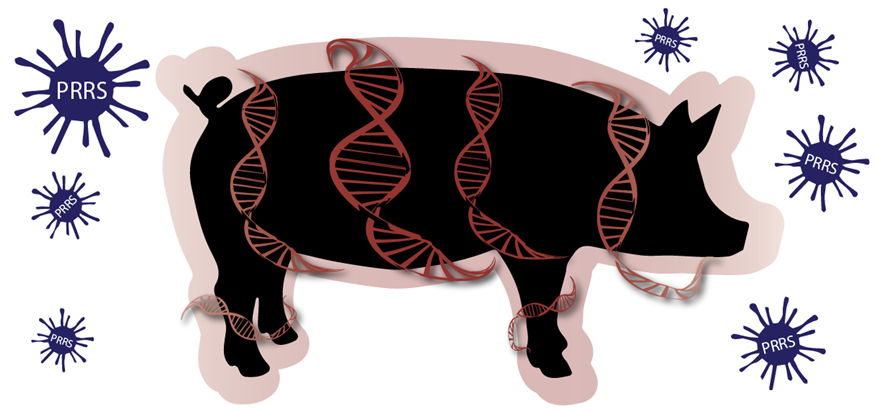



Genesus Global Technical Report: genetic improvement for resilience to PRRS
Porcine reproductive and respiratory syndrome (PRRS), is a disease affecting both reproduction and growth, and is a very costly viral disease for pig farms around the world.Vaccination for protection against PRRS virus (PRRSV) infection has generally been unsuccessful (Lunney et al., Annu. Rev. Anim. Biosci. 2016, 4:129). Therefore, it is very important to investigate other approach to improve pig`s resilience to PRRS.
Nucleus farms have high health status, and thus nucleus level collection of data on the effects of PRRSV infection is impossible unless there is a PRRS break. Thus, other approaches are required and genomic tools provide unique opportunities.
To this end, Genesus is a collaborator in genomics-focused PRRS research projects. Using controlled experimental challenge studies, genetic markers were detected for the pig`s performance (such as weight gain and viral load after infection) in response to PRRSV infection. A marker on chromosome 4 (abbreviated WUR) had significant effects on the pig’s response to PRRS during the early nursery phase (Boddicker et al., Genet. Select. Evol. 2014, 46:18). Pigs with the favourable WUR marker genotypes (BB and AB) had significantly lower viral load and higher weight gain than pigs with the unfavourable genotype (AA), indicating WUR could be used as a marker to select pigs for increased resilience to PRRS.

Now with the rapid developments in genomics, we can identify and select pigs with more resilience to PRRS, which means the selected pigs have better ability to maintain performance at a given level of infection (Bishop, Front. Genet. 2012, 3:168). Before applying WUR in breeding and selection programs, we need to make sure that this marker does not have adverse effects on other economically important traits.
For this, we analysed more than 18,000 litter records (> 8000 sows) in pure Landrace and Yorkshire sows to test WUR effects on sow litter birth and weaning traits.
- For Landrace, sows with AB (favourable) genotype of WUR have similar total number born, born alive, alive 24h and stillborn compared to sows with AA genotype.
- For Yorkshire, sows with the AB genotype performed similarly to sows with the AA genotype, except for the number alive at 24h which was about 0.53 (P < 0.08) higher for AB sows compared to AA sows.
- For sow litter weaning traits, all sows with AB genotype had higher, but not significantly, number weaned and total weaning weight than the sows with AA genotype.
Additionally, we tested the WUR effects in grow-finish traits, including days to 120kg, ultrasonic backfat depth and ultrasonic loin depth adjusted to 120kg, in >14,000 finisher pigs.
- In Duroc, Landrace and Yorkshire, pigs with different WUR genotypes had similar performance in all traits, indicating no significant effect of WUR on these grow-finish traits.
A recent study (Dunkelberger et al., J. Anim. Sci. 2017, 95:2838) also reported that the effect of WUR was not significant for almost all sow reproductive traits (total number of born, stillborn, lactation survival, farrowing survival and litter mortality). For finishing growth traits (backfat depth, daily gain and average daily feed intake), the effect of WUR was not significant for most growth traits but the magnitude and direction of the effect was a little different by trait and line. These reports are consistent with our analysis.
Therefore, selecting for the favourable WUR genotype is expected to increase the pig`s resilience to PRRS without compromising reproductive or grow-finish performance. Genesus uses several approaches to increase the pig’s resilience to PRRS in our breeding and selection program including:
- Genesus uses a custom designed SNP chip (> 55,000 markers) which includes the WUR SNP to genotype selection candidates shortly after birth. The WUR information is used for early selection decisions.
- We are factoring in the pig’s WUR genotype when doing planned matings so that we are able to increase the frequency of favourable WUR genotypes.
- In our selection program, we are including an animal’s WUR genotype in the final selection decision for young nucleus replacement animals to increase the favourable genotypes in our populations.
Utilising genomic information in mating and selection programs allows Genesus to increase our pigs resilience to PRRS and contributes to the ultimate goal of enhancing profit for Genesus customers.









